For centuries the myths and legends of Ireland, Scotland, Wales, and England have carried down through stories told around firesides, in halls, and finally transcribed and adapted in the pages of books—from The Mabinogion to The Lord of the Rings to The Once and Future King. We’ve gathered some of our favorite tales, some modern, and some quite ancient, to celebrate the Celtic spirit!
You can find all of these titles listed in the newly minted Tor Store on iBooks.
The Forest Laird—Jack Whyte
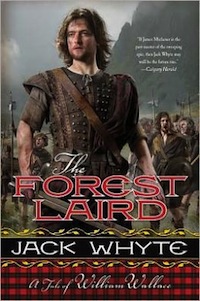
William Wallace waits for death. He lead his fellow Scots in a mighty fight against England, but now, caught by his enemies, he will be hanged, then drawn and quartered. He receives one visitor, a Scottish priest who hears his confession. Whyte’s novel gives us that confession, a tale of revolution, love, patriotism, and freedom, but most important, it takes us into the mind and heart of William Wallace the first true hero of the Scottish Wars of Independence.
This is the first book in the Guardians Trilogy. Set in the 14th century, the trilogy follows William Wallace, Robert the Bruce, and Sir James “The Black” Douglass they fight to liberate Scotland.
The Riddle-Master Trilogy—Patricia McKillip
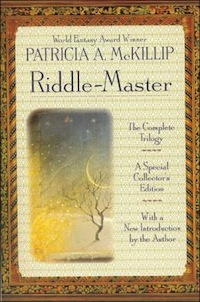
The Riddle-Master Trilogy blends Celtic mythology, riddles, and shapeshifting magic into a beguiling tale of discovery. The trilogy begins when Tristan discovers that her brother Morgon is hiding a crown beneath his bed. He explains that he won the crown in riddle-game with the ghost of King Peven of Aum.
When Morgon learns that the great King Mathom of An promised his daughter’s hand in marriage to anyone who could best the ghost, he heads off on a quest to claim his bride. But when he and his companions are attacked by shapechangers, he decides to change course, and instead seek the High One for answers. The trilogy follows his adventures, as well as those of his intended, the young witch-princess Raederle of An, as they learn the truths behind the land, the riddles, and the shapechangers.
The Dark Is Rising—Susan Cooper
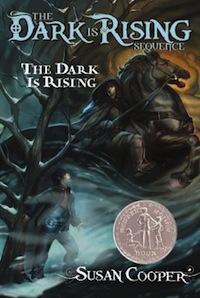
When Will turns 11, he discovers that he isn’t an ordinary boy—he’s actually the last of the Old Ones, destined to battle with the forces of darkness and recover the Grail.
Over the course of the 12 Days of Christmas he begins learning his true nature from the first Old One, Merriman Lyon. His story continues through the rest of the Dark is Rising Sequence, as he and Merry team up with the Drew siblings from Cooper’s earlier work Over Sea, Under Stone to fight the forces of Darkness that have been threatening England since Arthur’s time.
Mythago Wood—Robert Holdstock
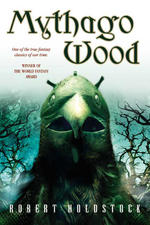
Robert Holdstock’s Mythago Wood, which won the World Fantasy Award for Best Novel in 1985, takes us to the ancient forest known as Ryhope Wood.
Stephen Huxley comes back from World War II to see his younger brother Christian, but finds that the young man has become obsessed with Ryhope, which stands on the edge of the family lands. Each time Christian goes into the forest he stays longer and longer, becoming more entangled with the mythical creatures known as mythagos. Will he be able to return to the every day world? Or will his obsession pull his family apart?
The Book of Three—Lloyd Alexander
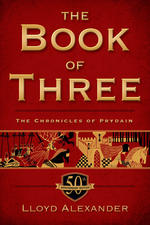
Taran is unsatisfied with his life as Assistant Pig-Keeper, even though the pig in question is oracular. When the prognosticating pig escapes, he goes on a chase that soon turns into an adventure!
Taran must work with the noble Prince Gwydion, sorceress-in-training Eilonwy, and a feral man named Gurgi to rescue the pig, elude the nefarious Queen Achren, and thwart the Horned King who seeks to wrap the land in Darkness. This is the first book of The Prydain Chronicles, Lloyd Alexander’s epic coming-of-age story, and an update of the Welsh Mabinogion.
The Horse Goddess—Morgan Llywelyn
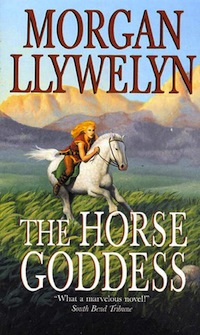
Far to the south, Athens rises. Across Europe mortal men and women are transformed into gods and goddesses as their adventures are repeated as legend. We know Epona now as the goddess of horses, whose cult spread across Europe, from the British Isles all the way to Rome.
But in Morgan Llywelyn’s story, Epona is a young horsewoman whose deeds are already being sung, but who is far from being a deity. She meets the Scythian warrior-prince, Kazhak, and together they flee across the continent from the Alps to the Ukraine, pursued by Kernunnos, a mysterious Druid priest known as the “Shapechanger.” Will they escape his grasp, or be ensnared in his evil?
Hounded—Kevin Hearne
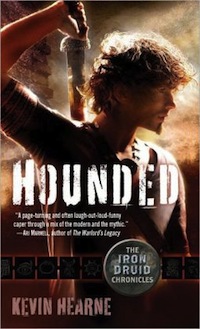
Tempe, Arizona probably doesn’t spring to most people’s minds when they hear the word “Celtic,” but Kevin Hearne creates a mythological wonderland with a desert backdrop!
In Hounded, we meet Atticus O’Sullivan, the proprietor of Third Eye Books and Herbs occult shop, who also happens to be the Last Druid, and his Irish wolfhound Oberon, who happens to be telepathic. Atticus deals well enough with most of Tempe’s magical residents, who include werewolves, vampires, and the occasional god… at least until he finds himself caught in a divine caper when his mighty sword, Fragarach the Answerer, sets off a series of godly dominoes.
Daughter of the Forest—Juliet Marillier
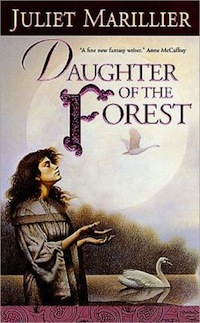
Sorcha is the youngest child of Lord Colum of Sevenwaters. She has no memory of her mother, and she has been raised by her six elder brothers. When her father is bewitched, and her brothers are enchanted and turned into swans, it is up to Sorcha to fight for her family and land. The only way she can save those she loves is to spin six shirts from poisonous, needle-like starwort, remaining absolutely silent, until the last one has been completed.
After years of this toil, a charming lord comes into her life and she sees possibilities for her life that were impossible before. Is the spell unbreakable? Or will she uphold her vow to save her brothers?
A Swiftly Tilting Planet—Madeleine L’Engle
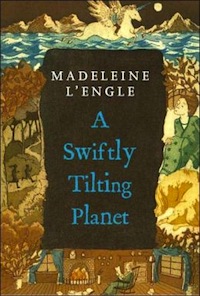
The third novel in L’Engle’s Time Quintet follows Charles Wallace Murray on an adventure through time and alternate histories!
Ten years after the event of A Wrinkle in Time, the Murray family is gathered for Thanksgiving when they learn that a nuclear war is imminent. Charles Wallace goes back in time with a unicorn to try to change the past for the better, while his older sister Meg connects to him through their psychic link.
Meg’s Irish mother-in-law provides clues, and possibly magical protection, as they try to change the course of fate. Irish, Scottish and Welsh culture are threaded throughout the book, as is the idea that Celtic travelers settled in North America centuries before Columbus.
Daggerspell—Katharine Kerr
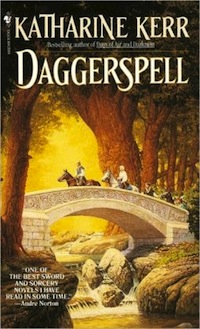
The mystical Wildfolk have always favored Jill. She’s never understood why, she just knows that they appear to her from another realm. But if she understood their true nature, it would reveal a past and future beyond her wildest imaginings.
Four hundred years before her birth, an arrogant lord caused the death of two young lovers. His vow to right this wrong echoes through time itself, and lays the foundation for Jill’s life, and all those she loves: her father, Cullyn; an exiled warrior called Rhodry Maelwaedd; and the ancient herbman Nevyn. They are all locked in a struggle with darkness that stretches across lifetimes, and bound to a destiny that was forged centuries ago.
The Last Light of the Sun—Guy Gavriel Kay
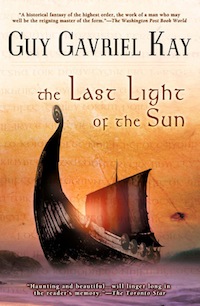
Guy Gavriel Kay’s The Last Light of the Sun meshes elements of Anglo-Saxon, Welsh, and Viking cultures to create a thrilling historical fantasy with the Anglcyn (Anglo-Saxon), Cyngael (Welsh), and Erling (Viking) civilizations locked in conflict.
Erling marauders regularly raid Anglcyn and Cyngael villages, and bloodshed and slavery are just part of life. Bern Thorkellson, an Erling, was enslaved after his father murdered another man, but now he’s escaped to seek vengeance against the man who stole his father’s prize horse. His father, meanwhile, is haunted by the past and seeks redemption for his murder. At the other end of the social spectrum, Aeldred, legendary king of the Anglcyn, struggles to enlighten his countrymen, while the Cyngael prince Alun tries to save his soul from Darkness. The lives of these four men will all entwine as they fight for their lands and their destiny.
The Mabinogion Tetralogy—Evangeline Walton

Evangeline Walton retells the First Branch of the Welsh Mabinogion, with a far more adult slant than Lloyd Alexander’s Prydain Chronicles. The Tetralogy includes the novels The Island of the Mighty, The Children of Llyr, The Song of Rhiannon, and Prince of Annwn.
The magical tales of mighty warriors, children who take to the sea, battles across continents, and cauldrons with the power to raise the dead have been the basis for much modern fantasy, all informed by the history of Wales and Ireland.
Moonheart—Charles de Lint
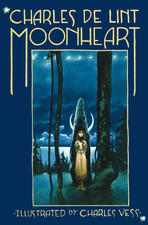
Sara Kendall runs an Ottawa antique store with her uncle, Jamie Tamsin. In their line of work they come across many fanciful objects: a painting of a Native American shaman’s first meeting with a European bard, an engraved bone disk, and a gold ring buried in clay. But what worries Sara is the affect these artifacts have on her. She’s drawn to them, pulled into a dangerous world that is only barely hidden. She soon realizes that not only are the otherworldly dangers real, but that there are also real evils in her own world.
When a secret division of the Royal Canadian Mounted Police sends an officer after her uncle and his friend, Thomas Hengyr, Sara knows that she needs to figure out the truth about the artifacts. But when a far older evil threatens them all, they will need to join forces and draw on all the magic of the Otherworld to protect themselves. De Lint infuses early-1980s Canada with the mysticism of ancient Wales in this urban fantasy.










I would definitely add the Fionavar tapestry to this group. It is an epic work and based around the Arthur legend.
I pretty much love anything by Juliet Marillier. Daughter of the Forest was the first thing I read by her – I was captivated by the cover; my friend (who, among other things, was very interested in Celtic history/folklore) was reading it and I started skimming it and got hooked.
“Daggerspell” I’ve considered reading, then set aside again … now might pick up again, given this context and background. Thank you.
Uh, No. As glad as I am to see them referenced, the Deverry cycle is based on GAULISH Celts, not British. There are differences. Admittedly, she doesn’t say this until book….6? 7? in one of the Afterwords, but it is referred to in its Wikipedia entry:
Deverry was founded by a Gallic tribe that fled Gaul to escape Roman rule. With the aid of a powerful magical being, they were transported to another universe. The government is feudal with the High King at the top and three lower ranks of nobility. The society is characterized by near-continuous internal warfare.
On a related note, I have yet another reason to dig into Within Temptation’s music, as one of their songs is about Jill and Nevyn…
Mists of Avalon?
@3 For the love of all that is holy, don’t read Daggerspell.
In my opinion, it’s an entirely forgettable series. Interesting magic system, and Nevyn is a great character, along with the reincarnation concept… but something about the series strikes flat for me. It doesn’t help that the author seems utterly pretentious with her forward, notes on pronunciation, and afterword. She is also extremely defensive about her work and her reasoning, taking pages to garrulously explain her methods and defend her choices based on common criticisms of the series. I wish she’d be above that in her work, but she seems to enjoy the petty squabbles and brow-beating people with her “superior knowledge and education”. The series also drags on for ages. Lots of trimming could have been done. Smells of a money grab to me.
I haven’t read The Forest Laird but reading the description I’m confused. Why is it on this list? It sounds like straight up historical fiction, not fantasy.
And on another note , I cannot agree with the first poster about The Fionavar Tapestry. That series was not good compared to his other works. Which reminds me, I do need to read The Last Light of the Sun; haven’t gotten around to that one yet.
Nearly all of Charles de Lint’s novels feature some fantasy from Britain and Ireland. I wouldn’t recommend someone to start with Moonheart, however. It is an excellent novel, but has a fairly slow and very intricate plot. “Forests of the Heart” is my personal favorite and serves as an update/retelling of the Greenman tale.
Don’t forget about Wheel of Time! More Arthurian references than you can shake a sick at.
What about Marion Zimmer Bradley’s “The Mists of Avalon” ?
Hunter of the Light by Risa Aratyr.
@10 and @5
We don’t talk about or buy MZB works now. She was an awful, awful, awful woman who did and enabled horrible things. Try to forget she existed, and let her works moulder in obscurity please.
In happier vein:
I vote for including some David Gemmel. A lot of his works have a touch of British Mythology about them, but most obviously the first two Sipstrassi Tales books which are a retelling of Arthurian Legends (the rest of the tales time skip to post apocalyptic, and a Wild West tone), and of course his “Rigante” series, which is a retelling of the Scottish wars of independence in a fantasy kingdom. Even in his more famous Drenai works (and his standalones) there are UK-Celtic and Saxon themes throughout.
@6 — Those comments are, well, wrong.
Reader of all the Devvery Cycle novels, some of them several times, so I oughta know, yanno?
There are of course innumerable Arthurian tales-retold, but I think my favorite is Gillian Bradshaw’s trilogy: Hawk of May, The Summer Country, and In Winter’s Shadow.
Two very different but both very good re-tellings of the “Tam Lin” legend, Tam Lin by Pamela Dean and Fire and Hemlock by Diana Wynne Jones.
Marie Brennan’s “Onyx Court” series about the fairy folk of London were also good, but not specifically based on any particular folktale or ballad.
And Susanna Clarke’s Jonathan Strange and Mr Norrell doesn’t have any identifiable English fairies in it, but it’s British magic through and through. And some of the short stories in The Ladies of Grace Adieu are based on or include traditional English tales. (Yes, I really enjoyed that recent re-read.)
De Lint’s Moonheart was his first novel. Personally I think it’s the best fantasy novel of the 20th century but I know other readers who just can’t get into it. So I recommend it with some caveats. If you like it don’t expect his other work to reach the same standard. Instead try John Crowley’s Little, Big or Mark Helprin’s Winter’s Tale. If you can’t get into Moonheart try de Lint’s more recent work. I don’t think it’s as good as Moonheart but it is very good.
Patricia Kennealy’s Keltiad novels (Kelts in spaaaaaaace! :D). Especially ‘The Hawk’s Grey Feather’, ‘The Oak Above the Kings’, & ‘The Hedge of Mist’, her versions of the Legend of Arthur.
@13 Those comments are simply my opinion on the cycle. You’re welcome to have your own. In fact, that is encouraged. I would love to hear what you enjoy about them, once you recover from being disturbed about my criticisms.
Kind Regards – M.
Jack Vance’s Lyonesse would be a good addition to this list.
Excalibur by Sanders Anne Laubenthal. One of the early Ballantine Fantasy book and unjustly forgotten. An Arthurian tale of the present-day Pendragon on a quest to locate the fabled sword Excalibur, in Mobile, Alabama. Opposing him are Queen Morgaine and Queen Morgause. There is even a Grail quest involved, too.
Some of my favorite books here!
I still (in my dreams) want to name a child Raederle…I’m not even sure how to pronounce it myself.
I’m a big fan of Kevin Hearne’s books! I really enjoy them!
Morgan Llywelyn is a wonderful author who has written in all time periods of Irish history, from the Tuatha de Dannans to The Troubles. She is, in many ways, the Bard of Irish History.
Just one thing, though, telling an Irish person they are part of the “British” isles is a great way to get yourself into the bad books of the Irish people who hear you say it. Much the same way that one of the few ways to piss off a Canadian is to call them American because the continent is named North “America”.
As far as works by Jack Whyte, I’d go with the Camulod Chronicles. Interesting reimagining of the Arthurian mythos with a Romano-British flavor.
Stephen Lawhead has lots of good ones based on British/Celtic mythology!!
Some great books here. I love the Deverry books and would happily take them as my only bo0ks on a desert island but my good friend and fellow SFF reader can’t stand them, so take that how you will. And as correctly pointed out, they are Gaulish (ie French) not British although admittedly it sounds very Welsh.
On that note I find Welsh inspired place names etc much easier to pronounce than Irish ones which tends to put me off some “Oirish’ fantasy. At least Kevin Hearne has a guide, although Irish friends tell me it is a bit hit and miss.
@Matt 42
In a shouthern german dialect Raederle (Räderle) would mean somthing like “little wheel/bicycle” ;-)
I was very happy to see Morgan Llywelyn on the list, but I think I would’ve chosen Druids over the Horse Goddess. Also, two more cheers for the Iron Druid series and the Deverry cycle from me.
I would also add the works of Kenneth C. Flint. He has written several books inspired by Celtic mythology.
Glad to see Charles de Lint’s ‘Moonheart’ on this list. Feel free to add many, many others of his books. He also writes a book column for The Magazine of Fantasy & Science Fiction.
@12
Wow, not sure if you were trolling or not…
I happen to like MZB’s works myself.
@30 – With the hope of not having this thread derail completely, I’ll just point you to this section of the author’s Wikipedia page, which will lead you to further information on what #12 was referring to.
And with that, let’s go back to talking about fantasies inspired by mythology from the British Isles. Anyone remember Mark Chadbourn’s Age of Misrule trilogy? It occasionally reads like a guided tour to the most important sites connected to British mythology. (And the Pyr editions have some amazing cover art by John Picacio. The cover for the first book has the distinction of being the first book cover to actively give me nightmares.)
In a shouthern german dialect Raederle (Räderle) would mean somthing like “little wheel/bicycle” ;-)
Shouldn’t bike be Rädele (without r)?.
For a different slant on Keltic Mythology (yes the spelling is intentional), try Patricia Kennealy Morisson’s Keltiad. What if the Tuatha’de didnt dissappear under the hills? What if they went back to the stars and took the old religions with them.
And yes, Bakajin, Fionavar is not one of Kay’s best works (I like Lions of Al Rassan and especially Tigana much more) but its a very good example of arthurian legend.
Regarding Moonheart, I’m in the camp that counts it as de Lint’s very best work — although I believe Bernard at #15 is wrong about it being his first, as that would be either Riddle of the Wren (from Ace) or Harp of the Grey Rose (from Donning/Starblaze).
Whether one likes Kerr’s Deverry novels or not (I bounced off Daggerspell and so didn’t follow the extended series), I have to agree that they’re technically DQed from this list, because Kerr has indeed cited mainland/Gaulish Celtic culture as her primary influence.
By contrast, I do like the Keltiad novels; OTOH, their spin on Keltic myth definitely counts as eccentric. Kennealy has clearly done a lot of research, but also clearly brings a very specific personal perspective to the material.
As for works not yet mentioned:
The Sleepers by Jane Louise Curry is a brilliant and often amusing modern Arthurian — I’m not just sure whether it would be classed nowadays as middle grade or YA — which has as much sense of wonder in one book as Susan Cooper packs into five. In particular, Curry nails the landing at the finale in a way that should delight those who hated the last pages of Silver on the Tree.
There are actually a number of female-centric Arthurians worth mentioning, dating back farther than you’d think: earliest is Vera Chapman’s “Three Damosels” trilogy, then there’s Sharan Newman’s Guenevere and its sequels, and I also quite liked Nancy McKenzie’s duology beginning with The Child Queen.
And last but far from least, I’ll restate my case for Tom Deitz’s Windmaster’s Bane and the ensuing series featuring Georgia teen David Sullivan and his friends, which are built on a dual foundation of strong Celtic groundwork and equally strong renderings of Cherokee mythology.
Needs more Bernard Cornwell!
I almost exlusively read Fantasy through my younger days, with a particular preference for this subsection and it was exactly because someone hadn’t reshelved Susan Cooper’s Dark is Rising series, so I am so glad it is on this list. I am very greatful to those books for taking me away from the Sweet Valley Twins and Baby Sitters Club.
Really great list — I clicked hoping to see Lloyd Alexander’s Prydain Chronicles, and was delighted to see Patricia McKillip’s Riddle-Master as well.
It seems like there was a deliberate choice to avoid books inspired by Arthurian legend — probably wise, since an entire list could be written just of books so inspired — but I’d like to throw in Mary Stewart’s wonderful series from Merlin’s perspective, starting with the Crystal Cave.
Ommadawn @@@@@ 30: No, that’s not trolling. MZB was involved in some vile abuse. A little googling will turn up the sordid details.
Don’t forget Andre Norton. Even aside from individual books such as _Huon of the Horn_ and _Steel Magic_, her whole Witchworld series is redolent of British myth.
Julian May’s Saga of the Pliocene Exile was the Irish Mythological Cycle entire , even down to the names and abilities of the children of Tanu. I don’t know how I forgot it.
@31 and #38
Thanks for the heads up. I won’t derail the thread any further but this was news to me! It certainly changes my attitude and feelings toward her and her work (sadly but unavoidable).
Katherine Briggs should be on this list. Hobberdy Dick, about an English estate’s hobgoblin in the dark days of Cromwell’s time, and Kate Crackernuts, based on a Scottish folktale, are both compelling. Briggs was a folklorist, and her Encyclopedia of Fairies is worth reading on its own.
An Elizabethan version of the Tam Lin tale is Elizabeth Marie Pope’s The Perilous Gard.
Please also read Alan Garner:
Elidor = The Four Hallows are transferred to and hidden in Manchester.
Weirdstone of Brisingamen & Moon of Gomrath = Arthur & his knights sleep under Alderly Edge. Colin and his sister Susan discover this and a whole magickal world.
The Owl Service = The tale of Llew Llau Gryffes & Bloddeuedd is retold in [fairly modern] North Wales….
It’s a good list; I’ve read several. Alexander Lloyd’s Prydain books were probably the single greatest influence on my deciding to take up writing Celtic fantasy myself, although I’m pretty much crazy for anything based in Celtic mythology and the Mabinogion in particular. I won’t look until after my current book is published, but I am especially interested in seeing what Evangeline Walton has done, and it looks like I can safely take a look a the books by Alan Garner, mentioned, by Philippa Chapman in the posts above, especially as I’m well past Llew and Bloddeuedd already.